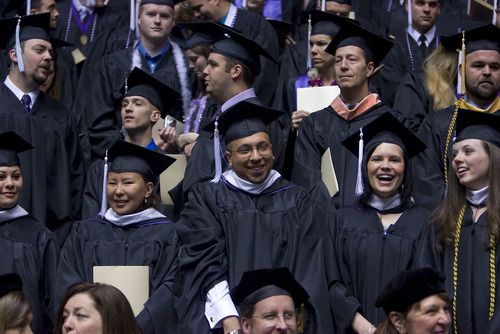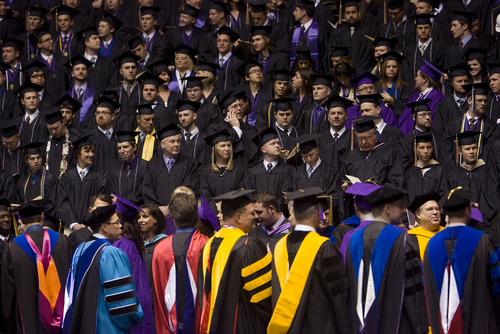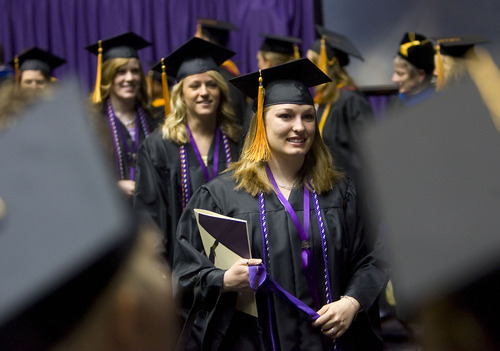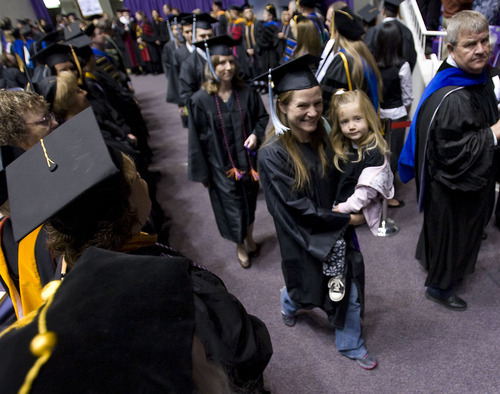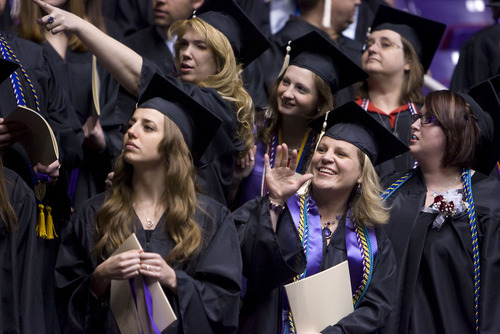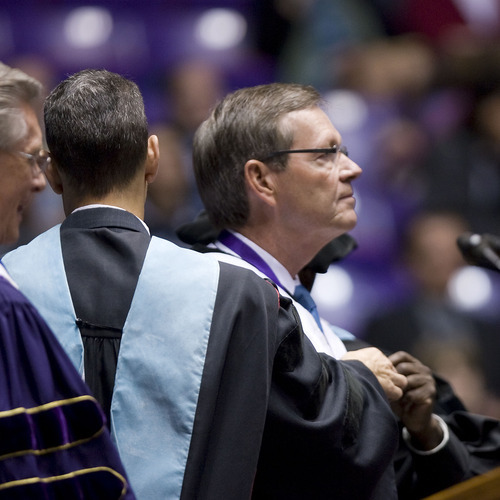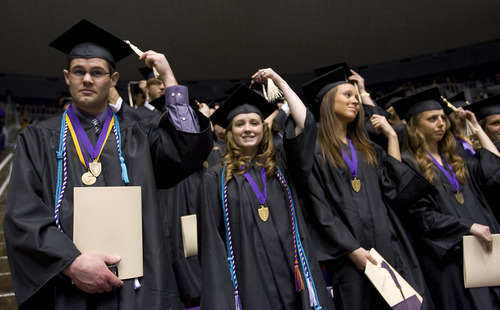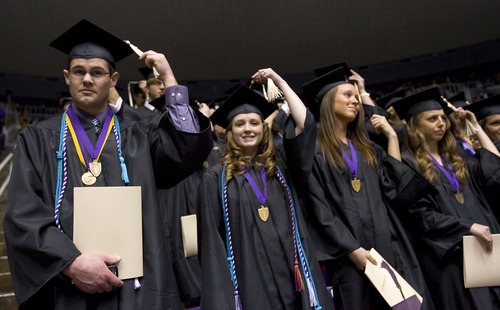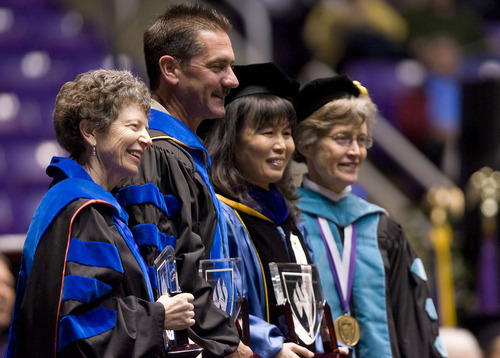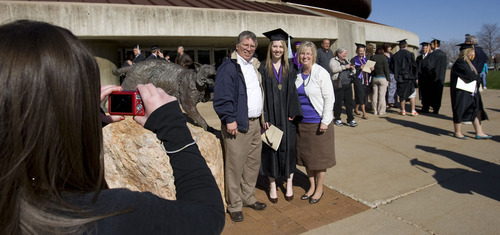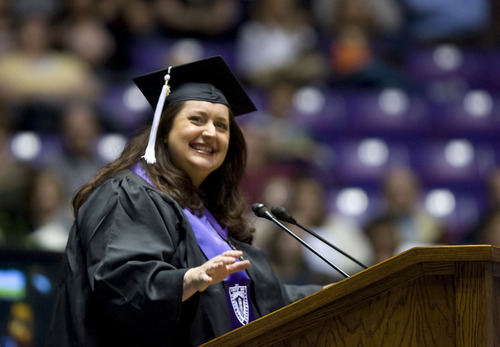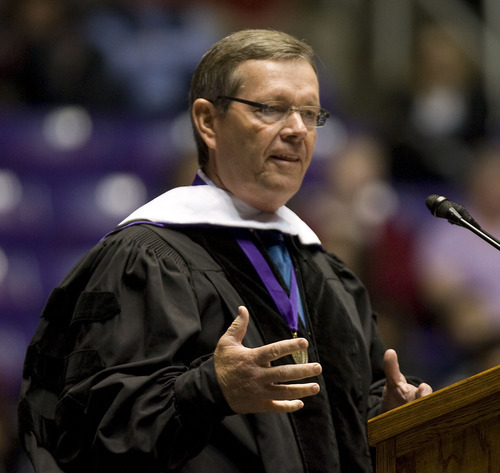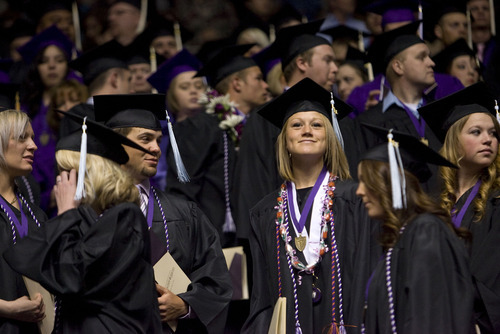This is an archived article that was published on sltrib.com in 2011, and information in the article may be outdated. It is provided only for personal research purposes and may not be reprinted.
Ogden • Former Utah Gov. Mike Leavitt shared with Weber State University graduates one of his "rather undignified" — albeit big — moments as he imparted practical advice Friday for making important decisions.
It was the spring of 2003, 10-plus years into Leavitt's tenure as governor. He was in the back seat of a Department of Public Safety limousine, changing behind darkened windows from a suit into golfing clothes as his buddies waited to tee off.
"Just as I got my pants off, the phone rang," Leavitt said, pausing for effect. "It's not exactly the situation one expects when the president of the United States calls."
Leavitt, who served in former President George W. Bush's Cabinet for more than five years, first as head of the Environmental Protection Agency and later as secretary of Health and Human Services, told thousands of graduates and their families that his five-point approach to making decisions ensures a deliberate process — if not always the right decision.
WSU awarded 1,775 associate, 1,974 bachelor's and 230 master's degrees to 4,028 graduates, 90 percent of them from Utah. The Good Friday event was the university's 137th commencement.
English major Amy Mayo Townsley urged her fellow graduates to pursue lives of passion and service worthy of the hard work it took to earn their degrees.
"Whatever you do, don't be realistic. The world has enough realists," she said, noting that realism often is an excuse to be lax about helping others or working toward higher goals.
Two graduates — Julia Cassidy and Sage Agbonkhese — said as they walked in for commencement that they already are on to the next stage: the work world.
Cassidy, 21, dropped out of high school in New Hampshire at age 15, earned her general diploma at 17 and, on Friday, and was awarded a bachelor's degree in psychology.
She came to WSU because she is an avid snowboarder. Next week, she will begin a job as a wilderness guide for at-risk youth in Maine.
"I love being outdoors," Cassidy said, "and now I get to be."
Agbonkhese, a Pennsylvania native, said it took him 16 years of intermittent schooling to get his degree. The 36-year-old spent six years in the Air Force, ending his career at Hill Air Force Base.
He graduated Friday with an associate degree in nutritional education and a bachelor's in anthropology, which, it turns out, has many applications. Agbonkhese just began working as a liaison for a property-management company, which requires an understanding of people and culture.
"My goal," Agbonkhese said, "is to get the word out: You can do a lot of things with an anthropology degree."
Leavitt blended stories about one of his own big decisions — leaving the governor's job for Bush's Cabinet — with an outline of the process he employs.
The first step is to put the decision into words. When one of Bush's aides called to ask if Leavitt might be interested, Leavitt recalled, "I did what I always do when faced with an important decision: I wrote a memo to myself."
Writing crystallizes one's thoughts and fills gaps in logic, he said. "It puts a bit of distance between you and the problem, gives you more objectivity than if you're only playing it out in your mind."
His second step is to "shrink the uncertainties," which means nailing down which unknowns can be known.
The third step is to examine one's biases. "Sometimes we make bad decisions because we're motivated by the wrong things ... passion or anger or fear or ego or greed or ambition or infatuation."
Leavitt's fourth step is to seek the counsel of others, and the ex-governor revealed a lesson learned in that regard. As he was considering a Cabinet post and trying to keep it secret, he consulted a former governor, who gave him a "searing criticism" of life in Washington. "He said if you want loyalty in politics, get a dog."
A couple of weeks later, he was the guest of a friend on a private plane to the nation's capital, reworking his memo to himself on his password-protected laptop. The next day, a reporter from The Salt Lake Tribune called about Leavitt's potential Cabinet slot, evidently tipped off by Leavitt's friend.
"I was disappointed a friend would look over my shoulder and call a reporter," Leavitt said. "And I thought, 'Welcome to Washington.' "
The fifth step in making a decision, Leavitt said, is to set a deadline and keep it. Once he makes a decision, Leavitt lets it "cure" overnight or a few days. In the case of going to Washington, he said, that made a difference between a "no" and a "yes."
What occurred to him over the weekend after deciding not to go to Washington, he said, was that he had accomplished what he wanted as governor and that his then-lieutenant governor, Olene Walker, would be an extraordinary governor, Utah's first woman to hold the office.
"The decision worked out well. I served for five and a half years and Governor Walker made history and served the state well."
Were you there?
Tag yourself in our Facebook photo gallery. • http://on.fb.me/e5ehbL


